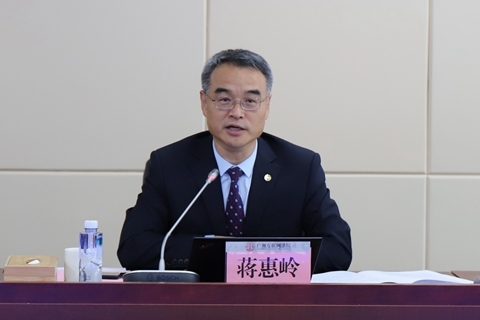
The 56 -year -old senior judge Jiang Huiling bid farewell to the Supreme Court who has worked for 33 years, and went south as the president of Tongji University Law School.Jiang Huiling has been engaged in judicial research for a long time and has participated in the top -level design of the judicial reform over the past 20 years.
According to Xinhua News Agency, on June 20, the Standing Committee of the National People's Congress released a list of appointment and removal, exempting the positions of many Supreme Court judges including Jiang Huiling.Jiang Huiling subsequently confirmed to Caixin reporter that he has recently went to Tongji University to report and will be the president of the law school.
Jiang Huiling was born in October 1963, a native of Binzhou, Shandong. At the age of 17, he entered the Beijing School of Political Science and Law (now China University of Political Science and Law). He obtained a bachelor's degree in law in 1984, obtained a master's degree in law in 1987, and entered the Supreme Court in the same year.During the period of the Supreme Court, Jiang Huiling was engaged in judicial research. He successively served as the institute's research office, the office, the China Applied Law Research Institute, and the judicial reform office.In 2006, Jiang Huiling was the deputy director of the Judicial Reform Office of the Supreme Court. From 2015 to 2018, he served as the director of the China Applied Law Research Institute.
According to public information, Jiang Huiling has been engaged in drafting work, participating in legislation, drafting judicial documents, and conducting applied law research, especially engaged in judicial reform, in particular, to participate in the people's court firstThe Five-Year Reform Outline (1999-2003) The second five-year reform outline of the People's Court (2004-2008) The Third Five-Year Reform Outline of the People's Court (2009-2013) The Fourth Five-Year Reform Outline of the People's Court (2014-2014-2018) The drafting and implementation of reform schemes and other reform plans have participated in the investigation and drafting of the reform plan of the central government system. They are witness, participants, and promoters of judicial reform over 20 years.
In 2018, the book of judicial reform was published in the book, and the system showed Jiang Huiling's thinking on judicial reform over the past 20 years.In the preface of the book, he wrote: In 1999, the Supreme People's Court formulated the first five -year reform outline.Since then, three five -year reform outlines have been introduced.During this period, many people were reluctant to think about it and do not want to talk about judicial reform due to the limitations of measures and time stagnation.Persisted on the day when the change happened.
As a legal person who has been engaged in judicial reform for a long time, Jiang Huiling said that he has become accustomed to observing the development of the rule of law from a judicial perspective, reviewing judicial work with reform thinking, and analyzing Chinese issues from a global perspective.If the judicial cold is cold, it seems that I am also a fever.Jiang Huiling hopes that her views and ideas can theoretically play a normal role in supporting and maintaining the judicial system in theory like anti -cold medicine.
In an interview with the Legal Daily in 2016, Jiang Huiling said that judicial reform must strictly follow the laws of judicial laws, reflect the independence, occupation, fairness, and authority of judicially, and the characteristics of judicial activities.He believes that regardless of the principles of referees and referees determined by the central government, or the president of the Council will no longer issue the specific institutional arrangement of the referee documents that have not participated in the trial case, it is a correct reflection of the laws of justice.However, the connotation of judicial laws and implementation are inevitably affected by the background of the era.Therefore, the planning of judicial reform must also be based on a deep and thorough understanding of the laws of judicial laws.
Jiang Huiling has been committed to Chinese and foreign judicial exchanges and comparative laws for many years. He has studied and studied at the University of Sydney, the University of Montreal, Canada, and McGill University.During his tenure at the State Judicial College, he organized a number of national judicial communities in the judicial community.
On the occasion of the Supreme Court, on June 22, Jiang Huiling gave an idea in the WeChat circle of friends.He wrote: If you change your identity, you just change to a battlefield and change a way to continue to contribute to the rule of law.
In recent years, the Supreme Court Senior Judge has been transferred to universities after leaving office.In November 2014, Sun Youhai, the deputy director of the Supreme Court Research Office and director of the China Applied Law Research Institute, retired at the age, and then transferred to Tianjin University. He is currently the president of Tianjin University Law School.Kong Xiangjun, deputy president of the First Tour Court, left, and then served as a professor of the Kaiyuan Law School of Shanghai Jiaotong University.



